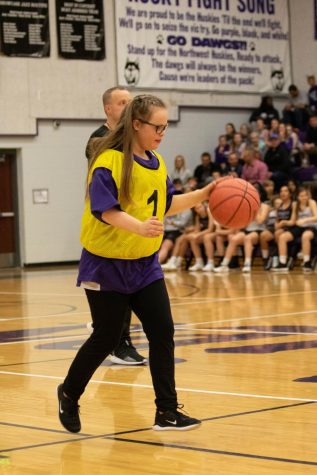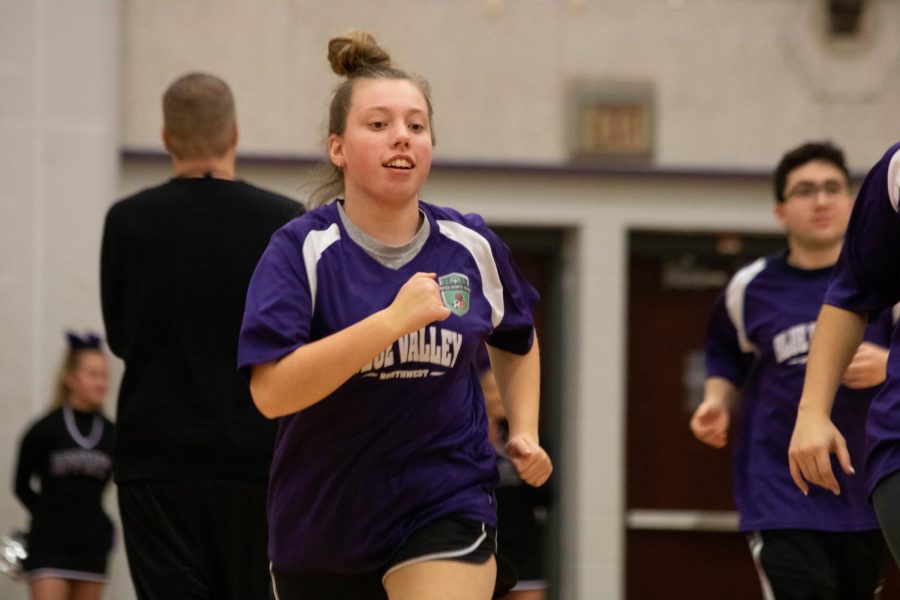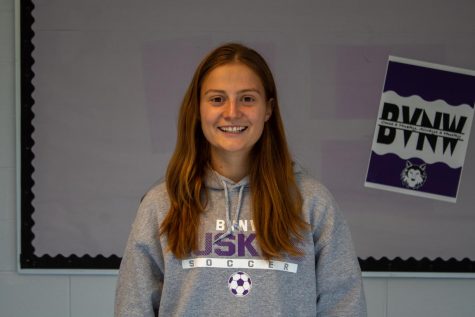Gerke helped create Unified Sports program at BVNW
Former Athletic Director Kevin Gerke was instrumental in establishing Unified Sports at BVNW, which allows students with special needs to play sports as a way to connect and socialize alongside their general education peers.
BVNW student Avery Reid participates in the Unified Sports basketball scrimmage at Late Night in the pound.
April 13, 2020
Prior to undertaking the role of athletic director, Kevin Gerke advocated for equal access for all athletes at BVNW. Together, in the spring of 2016, then activities director Gerke and former special education teacher Michele Boeding established a Unified Sports program.
A few years later, when intensive resource special education teacher Lauren Richter was offered her full-time job at Northwest, she said one of the main things Gerke shared with her was his passion for Unified Sports and his want for the program to continue to grow.
Sponsored by Special Olympics, the main goal of Unified Sports is to promote inclusivity and provide a place for students of all abilities to have access to friendly competition, according to Robin Hodges, another intensive resource teacher.
Richter said the idea of inclusion was something really important to the students in the resource room, room 102, and Gerke shared that value with her students.
“It is incredible to see everyone getting to participate and be an athlete,” Richter said. “That was something that was really important to us and also really important to Dr. Gerke.”
During the course of this year, and with the help of Gerke, Richter said Unified Sports has grown to include around 40 or more students, some with special needs and some without, who participate in soccer, basketball or both.
One such participant is sophomore Avery Reid, who is a student within the special education program. Participating on both the basketball and soccer Unified Sports teams, Avery said she enjoys winning and hanging out with her friends.
Avery’s mother Cyndi Reid said Unified Sports gives her daughter a feeling of inclusion, a social aspect and a sense of community that she might not get otherwise.
Being the athletic director, Gerke especially advocated for the general education athletes at the high school to get involved with Unified Sports, Cyndi said.
Furthermore, Cyndi and Richter both said how they discussed with Gerke the idea of making Unified Sports more prevalent in the school, even having athletes earn a varsity letter and be recognized at school assemblies the way that other sports programs are.
“I would say he was a huge advocate for Unified Sports and connecting all athletes throughout the school, whether it be an athlete or a Special Olympian,” Cyndi said.
Another example of Gerke’s efforts to be more inclusive, Richter said, is he invited the unified basketball team to participate in one of the scrimmages in front of the crowd as a part of Late Night in the Pound, an event that kicks off the winter sports season.

Sophomore Ainsley Aadland dribbles the ball during the Unified Sports basketball scrimmage at Late Night in the pound.
Perhaps an extra reason why Gerke was so passionate about Unified Sports was that half of the students in the special education program are sophomores and he was their grade level administrator. In fact, Cyndi recalled how Gerke sat in on one of her daughter’s IEP meetings, even though he did not have to.
Sharing a favorite memory of hers about Gerke, Boeding said how a few years ago Gerke helped a student with special needs walk across the stage at graduation, taking time out of his day to practice with her starting two weeks before graduation day.
“One of our students, Lauren Harding, had severe medical issues throughout high school. Our goal as a team of educators and her parents was when she graduated to have her walk across the stage,” Boeding said. “So Mr. Gerke came up with an idea and [we practiced how] she would walk up one side and Gerke would be on the other side and have her walk across the stage to him, which [was] great because that young lady ended up going across and walking to Gerke [on graduation day].”
In terms of Gerke’s impact on her, Cyndi said how she had never seen an athletic director place their attention on the non-premier athletes and care for them the way he did.
“In my experience, athletic directors really are [only] interested in the premier athletes and the fact that he had a heart for Special Olympics made him a hero in our book because he didn’t have to embrace that, but he completely did,” Cyndi said.
As for his impact on the students in room 102, Richter said he was a great example of inclusion for the entire school and genuinely cared for all of her students.
“ I feel like he was always a friend to all of my students. He genuinely cared for them,” Richter said. “He would go out of his way to say hi to them and just make them feel welcome and included.”
Richter also mentioned how she and Gerke had taken steps on applying to become a Unified Banner School, showing that BVNW met a variety of criteria involving inclusivity.
“I am really grateful for his leadership and his love for my students because I think we have made some really good progress toward becoming a more inclusive school,” Richter said. “I am excited to see how we can continue to honor his legacy by promoting inclusion and taking steps to become a banner school.”





Tom Blauvelt • Apr 14, 2020 at 10:03 am
Like most of the Blue Valley North West community, I was floored when I heard the news of Dr. Gerke’s passing. He was an advisor for my son Sean, who is a sophomore and is active in the Unified Sports program. Like his teacher Ms. Richter, I was amazed at the level of engagement Dr. Gerke had with my son and how he encouraged him and always had a fist bump for Sean. Dr. Gerke attended Sean’s IEP meetings as well and always chose to sit next to Sean and encourage him during the meeting. On the football field, Dr. Gerke enabled Sean to be a manager for the team and gave him specific duties to perform before and during the game with assistance from his bud, Dash.
I know that Dr. Gerke’s passion for students, sports, and family will be his legacy and I would like to offer my condolences to his wife and three sons. He will be greatly missed by all in the BVNW community.